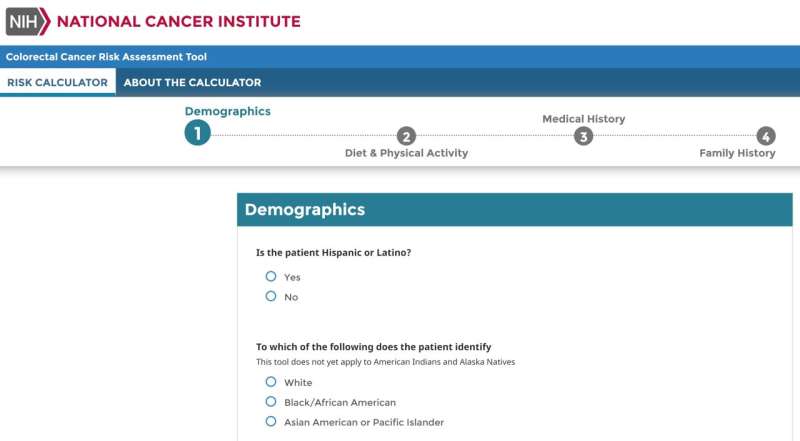
Regenstrief Institute and Indiana University School of Medicine research scientists have conducted a study of online colorectal cancer risk calculators. Colorectal cancer remains the second leading cause of cancer-related deaths in the U.S., so knowledge of disease risk and being screened for the disease are critically important.
Many individuals considering screening may want information on their personal risk when making decisions about screening, such as which type of test to select—at home stool-based tests or colonoscopy for example. Regenstrief research scientists Jennifer K. Maratt, M.D., M.S., and Thomas F. Imperiale, M.D., evaluated five online risk calculators to determine availability, ease of use, risk prediction capabilities and “behind the curtain” qualities showing how each was developed and whether it is based on rigorous statistical evidence.
All the online risk calculators required input of age, sex, body mass index, tobacco use and family history of colorectal cancer. Queries on race, ethnicity, education level, history of diabetes, history of colon polyps, dietary habits, medications and physical activity were inconsistently included.
To compare the risk calculators, the two researcher-clinicians reviewed published data on the tools—sometimes finding none—and created hypothetical test scenarios.
They found that there was a widely variable amount of evidence supporting the various risk assessment tools. However, for short term risk of colorectal cancer—five years and, in some cases, 10 years—there was fairly close agreement among the risk calculators. There was less consistency in predicting lifetime risk.
Overall, the study found the National Institutes of Health’s National Cancer Institute (NCI) risk assessment tool was the best.
“We conducted this study so that the public and clinicians will be aware that these risk assessment tools are easily accessible and to provide guidance on how to decide which to use,” said Dr. Maratt, who noted that because the NCI risk calculator was developed and validated in a U.S. patient population, among the calculators that were available, it is probably the best choice for individuals living in the U.S.
“Also, a risk prediction tool such as the NCI risk calculator could potentially be linked to and integrated into a patient’s electronic health record, a feature that could enable clinicians to consider many factors beyond age– such as family history, tobacco use, diet, exercise and other lifestyle habits for example—that influence risk, when discussing colorectal cancer screening with patients.”
“We were surprised to learn that some risk calculators had no evidence but pleased to learn that the NCI’s risk assessment tool for colorectal cancer has been validated. We were not surprised that long-term risk was more difficult for the calculators to estimate because people’s behaviors can change over time,” said Dr. Imperiale. “Patients can choose to continue with certain lifestyle choices, discontinue some or take on new ones, and of course, they can choose to get screened or, unfortunately, choose not to be screened.”
The results are published in The American Journal of Medicine.
More information:
Jennifer K. Maratt et al, Using Online Colorectal Cancer Risk Calculators to Guide Screening Decision-Making, The American Journal of Medicine (2022). DOI: 10.1016/j.amjmed.2022.08.008
Best tool: ccrisktool.cancer.gov/calculator.html
Journal information:
American Journal of Medicine
Source: Read Full Article


